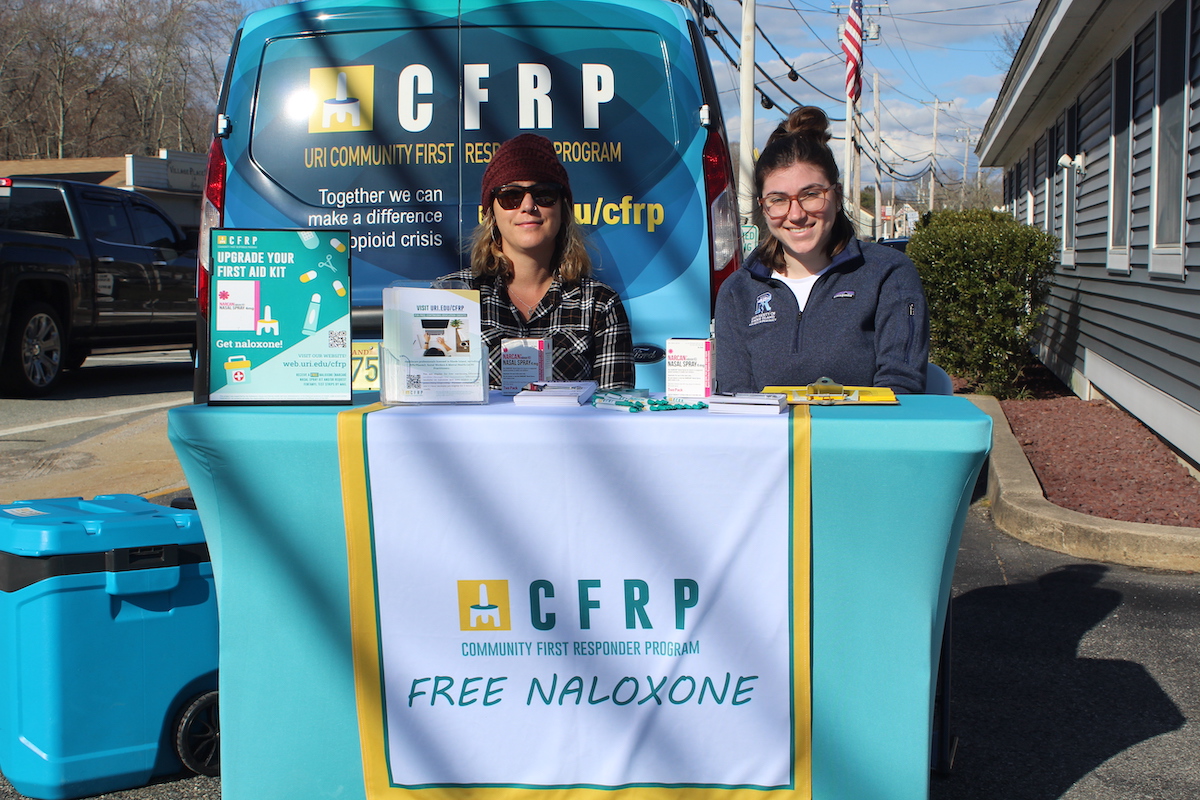Pictured: The URI college of Pharmacy handing out Narcan kits to high-risk communities for opioid overdoses. PHOTO CREDIT: uri.edu
The Community First Responders Program at URI saw the effects of their hard work this summer, as one of the Narcan kits they handed out was used to save a life.
Jacob Derby and Elliana Spagnolo, both juniors in the Doctor of Pharmacy Program at URI, were working at a table in Cranston handing out kits with two nasal spray bottles of Narcan to people on the street.
Narcan is a drug that blocks the effects of opioids and can save the life of someone who has overdosed on opioids. The College of Pharmacy started distributing Narcan kits in 2019, according to Anita Jacobson, a clinical professor in the College of Pharmacy and the program director of the Community First Responders Program.
“We assemble these kits that have the opioid overdose antidote, Narcan,” she said. “Its generic name is Naloxone. So Naloxone reverses a breathing emergency that someone could have when they have too much opioid in their system.”
According to Jacobson, these kits are becoming more important to save lives as opioid-related breathing emergencies are happening more frequently.
“So in fact, last year in 2021, there were over 100,000 drug overdose-related deaths in the United States. People who use any unregulated substance like heroin, cocaine, crack cocaine, methamphetamine, fentanyl, are at risk of having an opioid-involved breathing emergency,” Jacobson said.
Many people while listening to the students and faculty of this program talk at their table settings refuse to believe that they actually need Narcan. However, Cranston resident Michael Aubin decided to take two kits for himself in case he needed them.
He was the first person to reach out, according to Jacobson, and he reached out because he was someone who thought he didn’t need a kit Jacobson explained. He took one just if ever in the future he was in a situation where he needed Narcan.
Two days after receiving the kit from Jacob and Elliana, he was in the park and someone was apparently screaming that they needed Narcan. Aubin used his kit that he received two days prior and saved the person’s life.
Derby and Spagnolo found out the next week via email what had happened. Spagnolo said that she woke up to an email with a subject line that read “You Saved a Life!” which shocked her.
Both students said they felt very motivated and proud to hear this news and know that they directly impacted someone else’s life.
“It definitely felt rewarding to hear something like that when we did it paying off directly in our community, like someone that we interacted with,” Spagnolo said.
It felt so good for both of them to hear that they made an impact in someone’s life. Derby talked about how it sort of validated the work that they’re doing and how they will both continue to work harder in the future.
Jacobson explained that the program works hand-in-hand with the Rhode Island Department of Health (RIDOH) to better target where to distribute Narcan.
“The Department of Health has an opioid overdose surveillance program, and there’s a large team of people from the Department of Health from Brown University, from the University of Rhode Island, looking at data that comes in from law enforcement from emergency first responders like fire and rescue,” Jacobson said.
Derby, Spagnolo and Jacobson were all proud to have been able to help save a life through this program and have been motivated to continue this work and save more lives. To learn more about this program and the Narcan program, visit the Community First Responders Program website.





